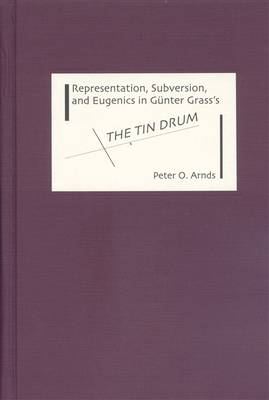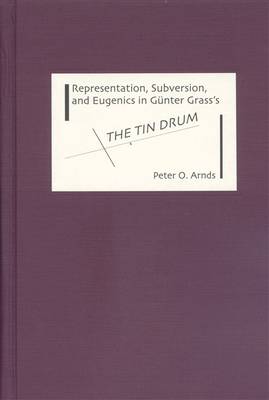
En raison d'une grêve chez bpost, votre commande pourrait être retardée. Vous avez besoin d’un livre rapidement ? Nos magasins vous accueillent à bras ouverts !
- Retrait gratuit dans votre magasin Club
- 7.000.000 titres dans notre catalogue
- Payer en toute sécurité
- Toujours un magasin près de chez vous
En raison de la grêve chez bpost, votre commande pourrait être retardée. Vous avez besoin d’un livre rapidement ? Nos magasins vous accueillent à bras ouverts !
- Retrait gratuit dans votre magasin Club
- 7.000.0000 titres dans notre catalogue
- Payer en toute sécurité
- Toujours un magasin près de chez vous
Representation, Subversion, and Eugenics in Günter Grass's the Tin Drum
Peter Arnds
115,45 €
+ 230 points
Description
A new reading of Grass's novel, emphasizing its treatment of the Nazi ideology of race and eugenics as it applied to "asocials." In receiving the Nobel Prize for Literature in 1999, Günter Grass, a prominent and controversial figure in the ongoing discussion of the German past and reunification, finally gained recognition as Germany's greatest living author, a writer of international importance and acclaim. Grass's 1959 novel The Tin Drum remains one of the most important works of literature for the construction of postwar German identity. Peter Arnds offers a completely newreading of the novel, analyzing an aspect of Grass's literary treatment of German history that has never been examined in detail: the Nazi ideology of race and eugenics, which resulted in the persecution of so-called asocials as "life unworthy of life," their extermination in psychiatric institutions in the Third Reich, and their marginalization in the Adenauer period. Arnds shows that in order to represent the Nazi past and subvert bourgeois paradigms ofrationalism, Grass revives several facets of popular culture that National Socialism either suppressed or manipulated for its ideology of racism. In structure and content Grass's novel connects the persecution of degenerate art tothe persecution and extermination of these "asocials," for whom the persecuted dwarf-protagonist Oskar Matzerath becomes a central metaphor and voice. This comparative study reveals that Grass creates in the novel an irrational counterculture opposed to the rationalism of Nazi science and its obsession with racial hygiene, while simultaneously exposing the continuity of this destructive rationalism in postwar Germany and the absurdity of a Stunde Null, that putative tabula rasa in 1945. Peter O. Arnds is associate professor of German and Italian at Kansas State University.
Spécifications
Parties prenantes
- Auteur(s) :
- Editeur:
Contenu
- Nombre de pages :
- 188
- Langue:
- Anglais
- Collection :
- Tome:
- n° 1
Caractéristiques
- EAN:
- 9781571132871
- Date de parution :
- 06-08-04
- Format:
- Livre relié
- Format numérique:
- Genaaid
- Dimensions :
- 160 mm x 236 mm
- Poids :
- 408 g

Les avis
Nous publions uniquement les avis qui respectent les conditions requises. Consultez nos conditions pour les avis.






